
Journal of Hydrology-Regional Studies
Scope & Guideline
Connecting global minds to tackle water challenges.
Introduction
Aims and Scopes
- Hydrological Modeling and Simulation:
The journal extensively publishes research on hydrological modeling techniques, including the application of various models (e.g., SWAT, HBV) to simulate streamflow, groundwater recharge, and water quality dynamics across diverse geographical settings. - Climate Change Impacts on Water Resources:
A significant focus is on assessing the impacts of climate change on hydrological cycles, including changes in precipitation patterns, evaporation rates, and their implications for water availability and management strategies. - Groundwater Studies:
Research on groundwater dynamics, recharge processes, and the interaction between surface water and groundwater systems is a core area, often utilizing isotopic and hydrochemical methods to trace and assess groundwater flow. - Integrated Water Resource Management:
The journal promotes studies that evaluate the integrated management of water resources, taking into account socio-economic factors, land-use changes, and policy implications for sustainable water use. - Flood and Drought Risk Assessment:
Papers often explore the assessment and modeling of flood and drought events, including the development of predictive tools and management strategies to mitigate risks associated with extreme weather phenomena. - Remote Sensing and Geospatial Analysis:
The use of remote sensing data and GIS for hydrological studies is prevalent, facilitating the monitoring and analysis of spatial and temporal changes in water bodies, land use, and climate impacts.
Trending and Emerging
- Machine Learning and AI in Hydrology:
There is a growing trend towards applying machine learning and artificial intelligence to hydrological modeling, forecasting, and water quality assessment, indicating a shift towards data-driven approaches. - Climate Resilience and Adaptation Strategies:
Research focusing on developing and assessing climate resilience strategies for water resource management has gained traction, reflecting an urgent need to address the impacts of climate change on water systems. - Transboundary Water Management:
Increasingly, studies are addressing transboundary water issues, emphasizing cooperative management strategies that involve multiple countries or regions, driven by globalization and shared water resources. - Hydrological Responses to Land Use Change:
Emerging themes focus on the interactions between land-use changes (urbanization, agriculture) and hydrological responses, highlighting the need for integrated land and water management. - Hydrological Extremes and Risk Mitigation:
A noticeable increase in research addressing extreme hydrological events (floods and droughts) and their management is evident, as communities seek practical solutions to enhance resilience against such occurrences. - Utilization of Big Data and Remote Sensing:
There is an upward trend in employing big data analytics and remote sensing technologies for hydrological research, allowing for more comprehensive analyses of hydrological processes across various scales.
Declining or Waning
- Traditional Water Quality Assessment Methods:
There appears to be a waning interest in conventional water quality assessment techniques, as newer methodologies leveraging machine learning and advanced statistical approaches gain traction. - Single-Factor Analysis of Hydrological Processes:
Research focusing solely on single-factor analyses (e.g., temperature or precipitation impacts in isolation) is decreasing, with a growing preference for integrated approaches that consider multiple interacting factors. - Case Studies with Limited Geographical Scope:
There has been a noticeable decline in publications centered on case studies with very localized geographical contexts, as researchers increasingly aim for broader applicability and regional relevance. - Deterministic Modeling Approaches:
Deterministic models are being overshadowed by probabilistic and ensemble approaches that better account for uncertainty in hydrological predictions, leading to a decline in the publication of traditional deterministic studies. - Static Hydrological Assessments:
Research that does not incorporate dynamic changes over time, such as climate variability or land-use changes, is becoming less common as the field moves towards more adaptive and responsive modeling frameworks.
Similar Journals
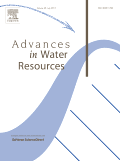
ADVANCES IN WATER RESOURCES
Bridging theory and practice in water resource research.ADVANCES IN WATER RESOURCES is a premier peer-reviewed journal published by Elsevier Science Ltd, dedicated to advancing the field of water science and technology since its inception in 1977. With an impressive Q1 ranking in the field, this journal provides a vital platform for researchers, professionals, and students to disseminate cutting-edge research that addresses critical issues related to water resources management, hydrology, and environmental sustainability. The journal offers a comprehensive collection of articles that explore innovative methodologies, policy implications, and case studies that shape the future of water resource management. Although it does not provide open access, its impactful contributions are recognized globally, making it an essential resource for anyone engaged in water science. The journal continues to publish relevant research while looking forward to bridging the gap between theoretical insights and practical applications up until 2024.
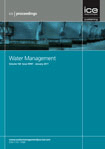
PROCEEDINGS OF THE INSTITUTION OF CIVIL ENGINEERS-WATER MANAGEMENT
Driving Change in Water Management through Scholarly ExcellencePROCEEDINGS OF THE INSTITUTION OF CIVIL ENGINEERS-WATER MANAGEMENT is a prestigious journal published by Emerald Group Publishing Ltd, dedicated to advancing the field of water management within civil engineering. With an ISSN of 1741-7589 and an E-ISSN of 1751-7729, this journal delivers peer-reviewed research that spans the critical intersections of water science and technology, contributing valuable insights into sustainable water management practices. As evidenced by its ranking in the 2023 Scopus categories, where it holds the Q3 quartile in Water Science and Technology, and a respectable position among its peers, the journal remains a vital resource for researchers, professionals, and students in the field. Though it is not an open-access journal, it offers accessible subscription options that facilitate worldwide dissemination of knowledge, enhancing its role as a fundamental reference point for cutting-edge developments in water management. For those looking to publish or stay updated on the latest research trends, this journal serves as an essential platform for promoting innovation and sustainable practices in civil engineering and water resources management.

Water Research X
Empowering researchers to tackle global water challenges.Water Research X is a prestigious journal published by ELSEVIER, focusing on the dynamic fields of water science and technology, pollution, ecological modeling, and waste management. Since its inception in 2018, this Open Access journal has become a cornerstone resource for researchers and professionals dedicated to advancing our understanding and management of water resources. Based in the United Kingdom, Water Research X holds an impressive ranking within the Scopus metrics, positioned in the Q1 category across multiple relevant disciplines, including Environmental Science, with a notable rank of 10/261 in Water Science and Technology and 3/41 in Ecological Modeling. This reflects its commitment to disseminating high-quality research that informs policy, supports sustainable practices, and fosters innovation in water management.
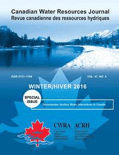
Canadian Water Resources Journal
Advancing sustainable solutions in water management.Canadian Water Resources Journal, published by Taylor & Francis Inc, is a leading academic journal dedicated to the field of water science and technology. With a significant history dating back to its inception in 1976, the journal offers a platform for high-quality, peer-reviewed research that addresses critical issues in water resources management, hydrology, water quality, and policy. The journal is recognized for its valuable contributions to the field, exemplified by its classification in the Q2 category for Water Science and Technology and holding a respectable rank of #137 out of 261 in the Scopus Environmental Science category. While it does not currently offer open access, its articles remain accessible through various institutional subscriptions, ensuring that professionals, researchers, and students stay updated with the latest advancements and discussions in water resources. As it converges towards its ongoing publication commitment through 2024, the Canadian Water Resources Journal remains an essential resource for those engaged in the pursuit of sustainable water management solutions.

Meteorology Hydrology and Water Management-Research and Operational Applications
Bridging theory and practice in meteorology and water management.Meteorology Hydrology and Water Management - Research and Operational Applications is a prominent academic journal published by the Institute of Meteorology and Water Management, based in Warsaw, Poland. With a focus on advancing the understanding and application of meteorology, hydrology, and water resource management, this journal plays a crucial role in disseminating high-quality research that contributes to both theoretical knowledge and practical applications in these pivotal fields. Although it operates under traditional access options, the journal is dedicated to providing valuable insights and solutions to challenges faced by researchers, practitioners, and policymakers in water management and environmental studies. Researchers keen on exploring innovative methodologies, operational tools, and empirical studies will find this journal an essential resource in enhancing their work and understanding of the dynamic interplay between meteorological phenomena and water resource management. The journal's commitment to maintaining rigorous scholarly standards ensures that every publication drives impactful dialogues within the community and beyond.
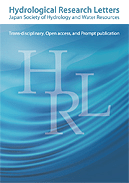
Hydrological Research Letters
Empowering Research: Navigating the Waters of DiscoveryHydrological Research Letters (ISSN: 1882-3416) is a distinguished peer-reviewed journal published by JSHWR, JAGH, JAHS, JSPH in Japan. Established with open access since 2007, this journal serves as a critical platform for the dissemination of innovative research in the field of hydrology, water science, and technology. With an increasing impact factor, currently positioned in the Q3 quartile for both Earth and Planetary Sciences and Water Science and Technology, it attracts a diverse readership keen to stay abreast of groundbreaking findings that shape water management and environmental policy. Researchers, professionals, and students alike will find this publication an invaluable resource for enhancing their understanding of hydrological processes and their implications. The journal is committed to fostering open academic dialogue and encouraging high-quality contributions during its converging years from 2015 to 2024. For more information, authors and readers can access the journal at its address, C/O INT ACAD PRINTING CO, LTD, Shinjuku-ku, Tokyo, Japan.
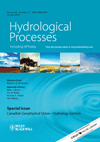
HYDROLOGICAL PROCESSES
Innovating Solutions for Environmental SustainabilityHYDROLOGICAL PROCESSES, published by WILEY, stands as a leading journal in the realm of Water Science and Technology. With an impressive impact factor and a prestigious ranking of Q1 in its category, the journal has carved a niche for itself since its inception in 1986, continuing to disseminate insightful research through to 2024. It boasts a solid Scopus ranking, sitting at #59 out of 261 in the Environmental Science field, placing it in the 77th percentile and emphasizing its relevance in the study of hydrological dynamics. Although not an open access journal, it provides essential and impactful articles that contribute to understanding hydrological phenomena, ensuring broad accessibility through libraries and institutional subscriptions. Researchers, professionals, and students alike will find HYDROLOGICAL PROCESSES a vital resource for the latest studies and advancements in water resource management and environmental sustainability.

Journal of Applied Water Engineering and Research
Bridging Theory and Practice in Water EngineeringJournal of Applied Water Engineering and Research is a dynamic platform dedicated to the advancement of knowledge in the field of water science and technology. Published by Taylor & Francis Ltd, this journal aims to bridge the gap between theoretical research and practical applications in water engineering, providing a crucial resource for researchers, practitioners, and policymakers. With an ISSN of 2324-9676 and an impressive ranking in the Q3 category for Water Science and Technology, it occupies a distinctive position within the scholarly community. The journal covers a wide spectrum of topics, including innovative water management strategies, sustainable practices, and the integration of technology in water resource management, thus contributing significantly to the discourse surrounding environmental sustainability. With publication years converging from 2013 to 2024, the Journal of Applied Water Engineering and Research continues to foster impactful research, enhancing our understanding and management of vital water resources.
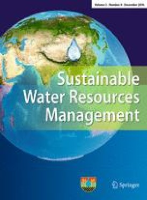
Sustainable Water Resources Management
Connecting policymakers and researchers for a sustainable tomorrow.Sustainable Water Resources Management is an esteemed journal focusing on the critical field of water resource management in the context of sustainability. Published by Springer International Publishing AG, this journal serves as a vital platform for researchers, policymakers, and practitioners to disseminate cutting-edge research and innovative practices aimed at addressing global water challenges. With an impressive impact factor aligned with its Q2 ranking in Water Science and Technology and Q3 in Renewable Energy, Sustainability, and the Environment, it maintains a robust reputation in its field, evidenced by its Scopus rankings. Covering a diverse range of topics from integrated water resource management to the nexus between water and energy, Sustainable Water Resources Management is committed to fostering knowledge exchange and encouraging interdisciplinary dialogue among its audience. This journal, operating under strict academic rigor, plays an essential role in advancing sustainable practices and is open from 2015 to 2024, making it a relevant resource in today’s rapidly evolving environmental context.
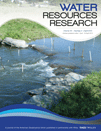
WATER RESOURCES RESEARCH
Driving Impactful Discoveries in Water ResourcesWATER RESOURCES RESEARCH, published by the American Geophysical Union, stands as a premier journal in the field of environmental science, specifically within the domain of water science and technology. With an impressive impact factor and a categorical ranking of Q1 for 2023, it ranks within the top 10% of relevant journals, evidencing its critical role in advancing the knowledge and application of water resources research. Since its inception in 1965, the journal has been dedicated to rigorous research that addresses pressing global challenges related to water resource management, hydrology, and environmental sustainability. The journal's comprehensive publication scope aims to present innovative findings and methodologies that can shape effective policies and practices. Although it does not offer open access, the robust research it publishes continues to influence academics and practitioners alike, ensuring its position as an essential resource for anyone engaged in the pursuit of water-related knowledge and solutions.